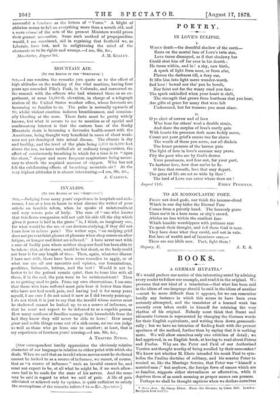MOUNTAIN AIR.
[TO THE EDITOR OF THE "SPECTATOR:]
Sru,—I can confirm the remarks you quote as to the effect of high altitudes on the working of the vital machine, having four years ago ascended Pike's Peak, in Colorado, and conversed on the summit with the officers who had wintered there as an ex- periment, at some 14,000 ft. elevation, in charge of a telegraph station of the United States weather office, whose forecasts are becoming so familiar to us. The pulse is normally upwards of 90, whilst violent exertion induces breathlessness, and occasion- ally bleeding at the nose. These facts must be pretty widely known, but what it occurs to me to mention as of special and confirmatory interest is that the eastern base of the Rocky Mountain chain is becoming a favourite health-resort with the Americans, being thought very beneficial in cases of chest weak- ness not yet developed into actual disease. The climate is dry and healthy, and the level of the plain being 3,000 to 6,000 feet above the sea, we have rarified air at ordinary temperatures, the effect of continuously breathing in which for a time is to "open the chest," deeper and more frequent respirations being neces- sary to absorb the required amount of oxygen. Who has not felt the exhilarating effects of breathing mountain air ? At the very highest altitudes it is almost intoxicating.—I am, Sir, &c., J. CARR ICK.






























 Previous page
Previous page